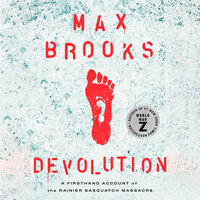Take a photo of a barcode or cover
I mostly enjoyed this, despite only liking one character. I didn't find it at all scary, but it was a fun ride once I'd told my brain to go take a coffee break. Kate as a main character drove me up the wall in a "I'm sooo neurotic, look at me being all edgy!" kinda way, and I was never sold on her transformation at the end. Mostar really brightened up the pages she appeared on, though, and, despite being not particularly fleshed out still was most likeable of the whole rotten bunch.
Devolution reminded me of those old 80s-90s horror movies that were so predictable. You know who's going to die (and usually when), and who's going to make it to the end, and the suspense was pretty shallow.
For all that, I did enjoy Devolution, but I was disappointed.
Devolution reminded me of those old 80s-90s horror movies that were so predictable. You know who's going to die (and usually when), and who's going to make it to the end, and the suspense was pretty shallow.
For all that, I did enjoy Devolution, but I was disappointed.
Honestly, the ending saved this book. Everything else was funny, which I knew would happen because it's about freaking bigfoot. But I thought, hey, why not. I thought it was a little comical and I wasn't really scared of Bigfoot. I thought the community was idiots. Which, is a realistic version of what would happen. However, it was a fun read. I listened to it on Audible, and the narrator's voice annoyed me so that didn't help. Her voice was valley girl-like.
Interesting fictional account in the max brooks interview style of storytelling as if it were a real account. The audiobook was great with multiple voice actors and celebrity voicing.
Dull characters, sluggish pacing, and a plot so bland it’s a chore to finish.
Wont waste my keystrokes on anything else related to this trash.
Wont waste my keystrokes on anything else related to this trash.
Had a blast reading this! It's definitely been a while since I breezed through a book but this was just too fun to put down. The horror isn't too scary here, but what really kept me hooked was the great character development (Katie became so likeable after being annoying in the first few chapters lol) and the consistent plot progression. Really appreciated the outside interviews interspersed throughout the book that provided different viewpoints.
A great and easy read!
A great and easy read!
adventurous
fast-paced
3 Stars.
The vibes:
- Sci fi
- Sasquatch massacre
- Audio was good
- Mystery
My thoughts:
This had a pretty slow start. Once we hit the monster element, I was intrigued and more invested. I think this is a really good look at how quickly a modern society can break down in the wake of a crisis. The deconstruction of the human condition is definitely clear in this book. I don’t think there was anything WRONG with the book, I just found it boring at some parts, and a little odd at other parts. It was still enjoyable and the audio narration was really great! The full cast made it an easy listen.
Note- gore/violence ; language
For the first two thirds of Devolution, my rating kept steady at a low 4-star review. It was bit too on the nose with its critiques and obvious with the author's self-insert, but entertaining enough. The final act, though, left me with serious questions about the author's intent, leaving the book teetering on the precipice of 2 stars, buoyed only by a charitable assumption that Brooks did not mean to convey the message I parsed.
I'm sympathetic to a lot of the satire introduced in the first half. We're introduced to a cast made up mostly of well-off Americans living out the common misconception that being able to see the forest in your backyard is environmentally-friendly and in tune with nature. Indeed, there's no little gross naivete in how civilization romanticizes nature and primitive living as idyllic and the book initially does alright poking fun at the fundamental unpreparedness of the group faced with the adversity of surviving isolated in the woods.
Our protagonist starts off as helpless as the rest of them, but turns around a bit too quickly faced with the challenges of the plot. While adversity does bring out a person's character, as the group's one wizened member declares, it feels forced by the narration, particularly as the protagonist loses more and more of her voice and reads increasingly only as a surrogate of the author.
The looming winter turns out to be the least of the group's problems as an especially vicious group of sasquatches descend. The humans' responses again fail to recognize the severity of the situation and Brooks rightly critiques the sometimes overgenerous naivete in our society towards negotiation and conflict with an adversary looking for nothing less than to aggress, subjugate, or exterminate.
Again, there's no little truth to that criticism. But what started to elicit a huge YIKES! from me was the out-of-nowhere interstitial beginning the final act. The aside yanks us briefly from our fantastical, black-vs-white, monster-vs-human fiction into the setting of Israel's conflicts with its neighbors. Particularly in light of current events in Palestine as of this review, this pulled me out of the in-progress valorization of our protagonist's evolving will to fight for her community and loved ones, reminding me of exactly why centuries of liberal thought has understandably downplayed such narratives: the language of defense of ones own community against extermination by a monstrous "other" has been a slanderous weapon of victimizer as much as, if not more than, a desperate rallying cry from the victimized.
Depicting an otherized group as essentially subhuman or replacing them in fiction with literal monsters to gain plausible deniability or stoke greater fear is a tactic as old as racism itself. Brooks knows this! He's spoken out against hatred against various groups in the wake of 7 Oct. But if it's his intent that we question the righteousness of our protagonist or be taken aback by her ultimate determination to abandon her humanity in favor of exterminating the entire species of which a tiny band killed her loved ones, I detected nary a hint.
I'm sympathetic to a lot of the satire introduced in the first half. We're introduced to a cast made up mostly of well-off Americans living out the common misconception that being able to see the forest in your backyard is environmentally-friendly and in tune with nature. Indeed, there's no little gross naivete in how civilization romanticizes nature and primitive living as idyllic and the book initially does alright poking fun at the fundamental unpreparedness of the group faced with the adversity of surviving isolated in the woods.
Our protagonist starts off as helpless as the rest of them, but turns around a bit too quickly faced with the challenges of the plot. While adversity does bring out a person's character, as the group's one wizened member declares, it feels forced by the narration, particularly as the protagonist loses more and more of her voice and reads increasingly only as a surrogate of the author.
The looming winter turns out to be the least of the group's problems as an especially vicious group of sasquatches descend. The humans' responses again fail to recognize the severity of the situation and Brooks rightly critiques the sometimes overgenerous naivete in our society towards negotiation and conflict with an adversary looking for nothing less than to aggress, subjugate, or exterminate.
Again, there's no little truth to that criticism. But what started to elicit a huge YIKES! from me was the out-of-nowhere interstitial beginning the final act. The aside yanks us briefly from our fantastical, black-vs-white, monster-vs-human fiction into the setting of Israel's conflicts with its neighbors. Particularly in light of current events in Palestine as of this review, this pulled me out of the in-progress valorization of our protagonist's evolving will to fight for her community and loved ones, reminding me of exactly why centuries of liberal thought has understandably downplayed such narratives: the language of defense of ones own community against extermination by a monstrous "other" has been a slanderous weapon of victimizer as much as, if not more than, a desperate rallying cry from the victimized.
Depicting an otherized group as essentially subhuman or replacing them in fiction with literal monsters to gain plausible deniability or stoke greater fear is a tactic as old as racism itself. Brooks knows this! He's spoken out against hatred against various groups in the wake of 7 Oct. But if it's his intent that we question the righteousness of our protagonist or be taken aback by her ultimate determination to abandon her humanity in favor of exterminating the entire species of which a tiny band killed her loved ones, I detected nary a hint.
adventurous
challenging
dark
emotional
informative
mysterious
reflective
tense
medium-paced
Plot or Character Driven:
A mix
Strong character development:
Yes
Loveable characters:
No
Diverse cast of characters:
Yes
Flaws of characters a main focus:
Yes





